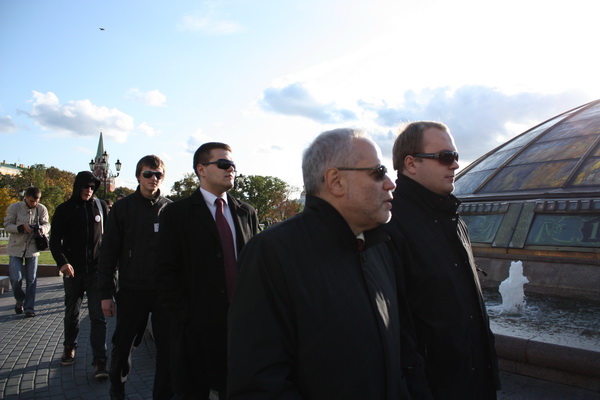On the Internet Day, September 30, a non-party flashmob
against the attempts of the Russian authorities to introduce
censorship in the Internet, restrict the use of Skype and
organise criminal persecutions against bloggers took place
in the centre of Moscow at the Manezh square.

Portraying Agent Smith (wearing black coats and black glasses),
the protagonist of the Matrix who thought that all the people
were viruses and denied freedom, the participants of the
flashmob walked in circles around the Manezh Trade Centre
always turning backwards (showing that the present regime
has been trying to return Russia to the totalitarian past).
In the fist circle several policemen from the special police
forces (OMON) joined the flashmobbers. In spite of the fact
that the policemen were wearing their traditional spotted
uniform they perfectly fitted into the picture. After making
a circle with the flashmobbers, OMON preferred to watch
the happening from the outside.
“The action was prepared as a protest against criminal
persecution of bloggers, however, we had to broaden the
scope of topics,” said Alexander Gnezdilov, member of YABLOKO’s
Youth Chamber with the Moscow City Duma. According to Gnezdilov,
“two days before the action we learned that the Ministry
of Communication had prepared a draft law obliging Internet
providers to cooperate with special services and to block
any Internet use on their demand.”
In addition, this draft law envisaged legal introduction
of the term “the Russian segment of the Internet” which
can lead to introduction of censorship “in the Russian segment”
of the Internet, as was done in China.
Gnezdilov also noted that the flashmobbers also protested
about the attempts to make Skype expensive so that people
could not afford buying this service. According to Gnezdilov,
Skype has been a pain in the neck for Russia’ secret services,
as they can not bug it and Russia’s mobile operators are
also against Skype as it is inexpensive.
“Unfortunately, the political forces supporting such initiatives
are in power now. They are not used to functioning in the
conditions of a fair competition and they would like to
turn Internet in something like modern Russia’s television,”
Gnezdilov said.
Chair of the Moscow City Duma Commission for Education
and Science and member of YABLOKO Eugeni Bunimovich agreed
with Gnezdilov, “Internet is a space of freedom and real
democracy, which irritates the authorities so much.” He
also stressed that this also implies that we should fight
against terrorist ideas and pornography in the Internet,
as well as in the reality. According to Bunimovich, “the
[Russian] society receives the most objective political,
social and even everyday information in the Internet”. “Internet
communities of teachers, journalists, doctors, cyclists,
young people, etc. turn into real nucleuses of civil society,”
Bunimovich said.
Photographs from the action see at the
Moscow YABLOKO web-site
See also:
Overcoming
Stalin’s Legacy
Human
Rights